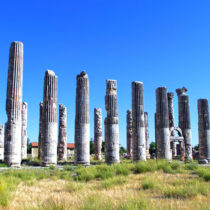The German composer Carl Orff (1895-1982) avoids “European loquacity”, a trait attributed to her contemporaries by Virginia Woolf who was comparing them to the ancient Greeks. Being knowledgeable in matters of ancient Greek culture, Orff set to music the Sophoclean tragedies of Antigone and Oedipus Rex in translations by Holderlin, as well as Aeschylus’ Prometheus Bound in the original text. Ιn the staged concerto Trionfo di Afrodite, Orff used the original verses by Sappho and Euripides. His Carmina Burana together with the Catulli Carmina and the Trionfo di Afrodite in the Triumphant Theatrical Triptych were presented with songs and dance in a lyrical composition called Die Welt der Liebe. In his final work, De temporum fine comoedia, presented by Orff himself, he sets Greek Sibyllic prophecies to music and invokes the god Oneiros, from one of the Orphic hymns. In To an Unknown God, the ancient text made up of twelve hymns is set directly to music. The edition is prepared by Werner Thomas. The article presents three hymns in ancient Greek and in their modern Greek translation. The hymn to Oneiros (Dreams), to Death and to Aphrodite.
Carl Orff and the Orphic Hymns
06 Aug 2012
by Archaeology Newsroom
- A
- A
- A


